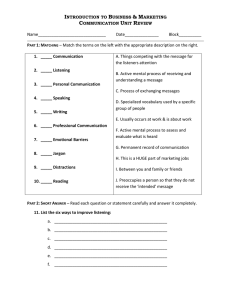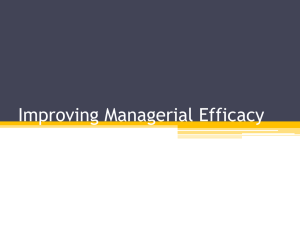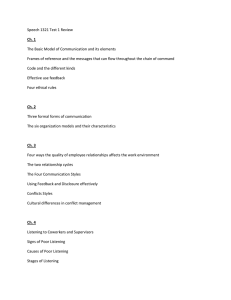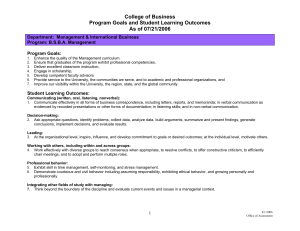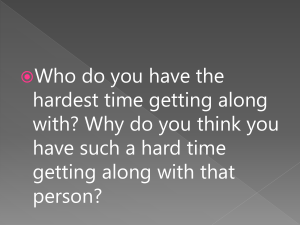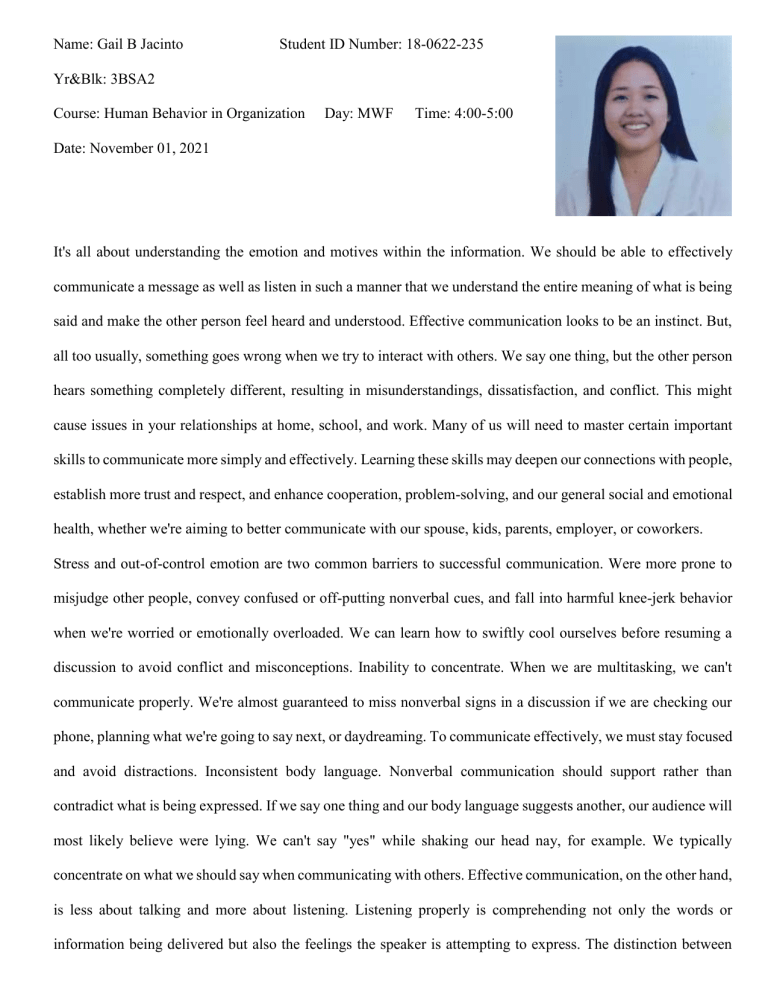
Name: Gail B Jacinto Student ID Number: 18-0622-235 Yr&Blk: 3BSA2 Course: Human Behavior in Organization Day: MWF Time: 4:00-5:00 Date: November 01, 2021 It's all about understanding the emotion and motives within the information. We should be able to effectively communicate a message as well as listen in such a manner that we understand the entire meaning of what is being said and make the other person feel heard and understood. Effective communication looks to be an instinct. But, all too usually, something goes wrong when we try to interact with others. We say one thing, but the other person hears something completely different, resulting in misunderstandings, dissatisfaction, and conflict. This might cause issues in your relationships at home, school, and work. Many of us will need to master certain important skills to communicate more simply and effectively. Learning these skills may deepen our connections with people, establish more trust and respect, and enhance cooperation, problem-solving, and our general social and emotional health, whether we're aiming to better communicate with our spouse, kids, parents, employer, or coworkers. Stress and out-of-control emotion are two common barriers to successful communication. Were more prone to misjudge other people, convey confused or off-putting nonverbal cues, and fall into harmful knee-jerk behavior when we're worried or emotionally overloaded. We can learn how to swiftly cool ourselves before resuming a discussion to avoid conflict and misconceptions. Inability to concentrate. When we are multitasking, we can't communicate properly. We're almost guaranteed to miss nonverbal signs in a discussion if we are checking our phone, planning what we're going to say next, or daydreaming. To communicate effectively, we must stay focused and avoid distractions. Inconsistent body language. Nonverbal communication should support rather than contradict what is being expressed. If we say one thing and our body language suggests another, our audience will most likely believe were lying. We can't say "yes" while shaking our head nay, for example. We typically concentrate on what we should say when communicating with others. Effective communication, on the other hand, is less about talking and more about listening. Listening properly is comprehending not only the words or information being delivered but also the feelings the speaker is attempting to express. The distinction between active listening and just hearing is significant. We may hear minor intonations in someone's voice that tell you what they're feeling and the emotions they're attempting to transmit if we truly listen—if we're interested in what they're saying. When we listen actively, we not only gain a greater understanding of the other person, but we also make them feel heard and understood, which may help us form a stronger, deeper bond. We'll also benefit from a process that reduces stress and promotes physical and emotional well-being by connecting in this way. If the person we're speaking with is peaceful, for example, listening attentively will help you relax as well. In the same manner, if the individual is upset, we might assist them to relax by listening carefully and making them feel understood. Listening actively and attentively will often come effortlessly if our purpose is to completely comprehend and connect with the other person. The way we look, listen, move, and respond to another person may tell them a lot more about how we're feeling than words can. Facial expressions, body movement and gestures, eye contact, posture, voice tone, and even muscular tension and breathing are all examples of nonverbal communication or body language. Learning to recognize and use nonverbal communication may help us to connect with people, express ourselves more clearly, negotiate difficult circumstances, and develop stronger relationships at home and work. Strong expression promotes straightforward communication and can improve self-esteem and decision-making abilities. Being assertive entails being open and honest about our opinions, feelings, and desires, as well as standing up for ourselves and respecting others. It does not mean being aggressive, rude, or demanding. Understanding the other person is always the goal of effective communication, not winning an argument or pushing our beliefs on others. Effective communication skills not only allow a person to have a balanced life, but they also allow them to build good work ethics, which helps them to pursue a successful profession. A person who has learned basic methods like leaning forward in a chair to indicate to the speaker they are interested in what they have to say will go a long way toward developing a highly remarkab le personality. Effective communication not only helps with the development of a strong personality and a healthy career, but also assists in the development of great connections with one's parents, spouses, and siblings. These connections and relationships are necessary for an individual to have a happy life because they provide us with individuals who will care about you in times of need and comfort you when you are uncertain.

